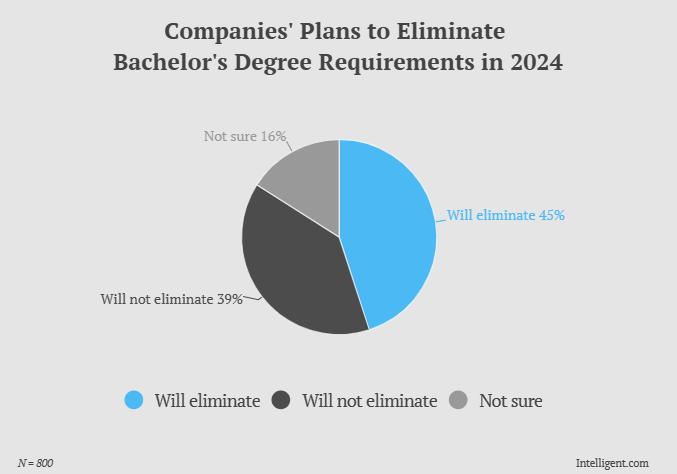The idea of a Bachelor's degree in Recruiting has been a topic of discussion among HR professionals for years - most recently (at least in our inboxes) from our industry friend, Tim Sackett. And while a specialized program seems appealing, I've a significantly different take in that its practicality in the current job market, especially considering the recent trends in hiring practices and technologies, is debatable.
Companies are revising their job requirements, reducing the need for a bachelor's degree for many roles. This change, moving away from the trend of degree inflation since the Great Recession, started before COVID-19 and is likely to continue. For further details, we'd recommend downloading last year's report from The Burning Glass Institute, which offers deeper insights into this ongoing shift.
Firstly, the skills required for successful recruiting are diverse and largely gained through real-world experience. Recruiting is a unique blend of interpersonal skills, business understanding, marketing acumen, and adaptability, which are currently developed through broader fields like Business, Human Resources, and Communications, coupled with hands-on experience in the workplace.
The rapidly changing landscape of recruitment, driven by rapid tech advancements and always evolving market needs, might render a highly specialized recruiting curriculum quickly outdated. The flexibility of a more general degree allows graduates to adapt more effectively to these changes.
Moreover, there's a risk that a degree too narrowly focused could limit graduates' career flexibility. A more versatile educational background provides a foundational skill set applicable in various roles within an organization, not just in recruiting.
These points align well with recent trends in hiring practices. As an example, according to a November 2023 survey by Intelligent.com, (and there are plenty out there) a significant shift is occurring in companies' approach to degree requirements. With 55% of companies eliminating bachelor’s degree requirements in 2023, primarily for entry-level roles, the necessity of a specialized recruiting degree becomes further questionable. This trend suggests a broader movement towards valuing skills and experience over formal education, particularly for entry-level positions.

The majority of recruiting jobs, being entry-level, may not require such specific academic qualifications. Instead, employers are increasingly seeking candidates with practical experience and relevant skills. This shift is also in line with efforts to create a more diverse workforce. Since a bachelor's degree can be a barrier for individuals from underrepresented or lower socio-economic backgrounds, requiring such a degree for recruiting roles could inadvertently limit diversity in our own field.
Considering that 80% of hiring managers favor experience over education and the rising interest in alternative educational pathways like certificate programs, apprenticeships, and online courses, the focus might be better placed on developing practical, hands-on experiences in recruiting. This could include internships, mentorship programs, well-established certifications, or specialized short courses or masterclasses that align more closely with the evolving needs of employers and the diverse backgrounds of candidates.
In summary, while a Bachelor’s degree in Recruiting offers a focused approach to education in this field, the current job market trends and the importance of diversity, equity, and inclusion in hiring suggest a more flexible, experience-based approach to developing recruiting skills may be more effective and inclusive. In short, I'd say that it's long past time for more of us to align with efforts to tear the paper ceiling. As the field of recruiting continues to evolve, so too must our approach to education and skill development, ensuring that we are equipping future professionals with the tools they need to succeed in a dynamic and diverse workplace.
#CollegeRecruiting#Leadership#Diversity